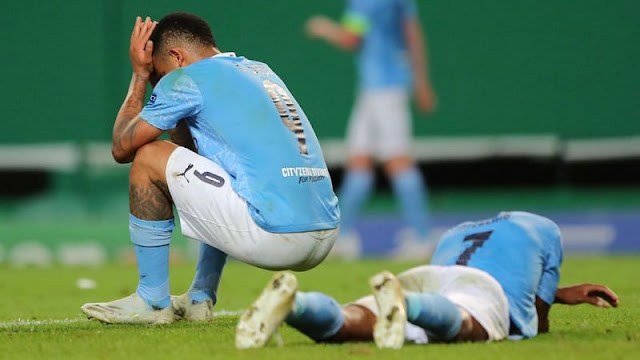
How Manchester City deal with the burden
of their Champions League final defeat will be the ultimate psychological test.
 |
| Phil Foden lies on the ground at full-time as Manchester City’s Champions League dream fell apart in the final. Photograph: Matt McNulty/Manchester City FC/Getty Images |
The morning after the night before, the
images retained a haunting quality for Manchester City supporters. Never mind
the sight of many of their players slumped over or stretched out along the turf
at the Estádio do Dragão following the death of the Champions League dream, it was Pep Guardiola, inevitably, who best
caught the frustration and despair.
The City manager had wanted to make one thing
clear after the 1-0 loss to Chelsea in the final in Porto. “I’d like to say it
was an exceptional, exceptional season for us,” Guardiola said, and nobody
disagreed. A third Premier League title in four attempts, won by a 12-point
margin, is Exhibit A for the defence, and then there has been the quality of
the football: fast, incisive, technically brilliant.
When Guardiola falls short in the Champions
League, as he has now done five times at City, there are critics who argue that
he hfailed in his job. The theory runs that the Champions League is the trophy
that the cluab ndas its owner, Sheikh Mansour, most want and so if Guardiola
cannot deliver it, he will be forever damned.
It is nonsense and ignores the rest of Guardiola’s
work; the domestic silverware, the week-in, week-out entertainment for City
fans, his wider influence on the English game. And yet, at the same time, there
is no doubt that the gap on his CV stands to affect his City legacy. While it
remains there will be an asterisk. Just as now, there is one against his team’s
season.
Guardiola went through all his little tics during
a post-match press conference he did not want to give, touching the stubble
above his lip, scratching at his furrowed brow, fidgeting, shrugging. He barely
knows what it is to lose a major final – this was only his second such reverse,
the other being the Copa Del Rey defeat to Real Madrid with Barcelona in 2011.
This season he had previously lost only one must-win game, to Chelsea,
uncoincidentally, in the FA Cup semi-final.
The novelty factor deepened the pain, accentuated
the soul-searching. It is a scar that at best will take some time to heal given
the distance to next season’s final. At worst it may never do so and if that
sounds like an exaggeration, then consider that this was Guardiola’s first
final since 2011, also with Barcelona.
“It’s one of those that you don’t want to keep
dwelling on,” Raheem Sterling, the City winger said with a blank stare. “Move
on.” Good luck with that.
Rather abruptly, Guardiola and his players have
unwanted baggage that will remain with them throughout the summer and probably
for most of next season. How they carry it will be the ultimate psychological
test, particularly as the defeat will be mentioned regularly, deepening unwanted narrative.
The defeat in last
season’s quarter-final to Lyon was bad, mainly because of its self-inflicted
nature. This was worse. Against Lyon, Guardiola had started with a surprise
3-4-2-1 system, which featured Fernandinho on the right of the defensive three,
and it did not work. However, after a tactical rejig City got back into it and,
despite their errors, could also lament an open-goal miss from Sterling on 86
minutes for 2-2. How to legislate for that?
Against Chelsea, while the margins were similarly fine, City did not give the
impression they had a goal in them. They created virtually nothing in the
second half. Chelsea were the better team in the first half and, once in front,
backed themselves to close out the result.
A year on from Lyon, City were the defending Premier League champions rather
than the runners-up. They had Rúben Dias, the player of the season, plus plenty
of others who have improved greatly, chiefly John Stones, Ilkay Gündogan and
Phil Foden. And yet they hit a wall.
Guardiola certainly chose quite the moment to start without a specialist
defensive midfielder, with both Fernandinho and Rodri left on the bench. One or
both had started in every one of the club’s previous 60 matches this season bar
the Champions League group stage win over Olympiakos in November.
Instead, Guardiola used Gündogan – the team’s top scorer this season – as his
deepest-lying midfielder. The lack of protection for the defence was a feature
of the first half, most damagingly when Chelsea broke quickly for the Havertz
goal. Sterling was asked whether the absence of Fernandinho and Rodri had been
a problem. “I thought we started off really well,” he replied. “We were in the
game and it [the goal] was a counterattack … we knew exactly what they were
going to do and that’s exactly what happened.”
Guardiola had infamously lost a Champions League semi-final second-leg with
Bayern to Madrid in 2014 by a 4-0 scoreline, having set up with attacking
personnel. His team were shredded on the counter and he vowed to never again be
so open. And yet the flaw was there against Chelsea in a lineup loaded with
offensive-minded midfielders and wingers. They struggled to execute a
complicated game plan.
What
was interesting to hear from Guardiola were repeated references to it having
been City’s and most of his players’ first Champions League final. Only
Gündogan had played in Europe’s showpiece final before.
The subtext was that the experience will stand them in good stead for the
future. All clubs must suffer heartbreak before they triumph in this most
capricious of competitions. And yet their conquerors in Chelsea blue were
equally inexperienced, with only Thiago Silva having appeared in a previous
final. City’s regrets run deep. The days ahead will be hard.










Comments